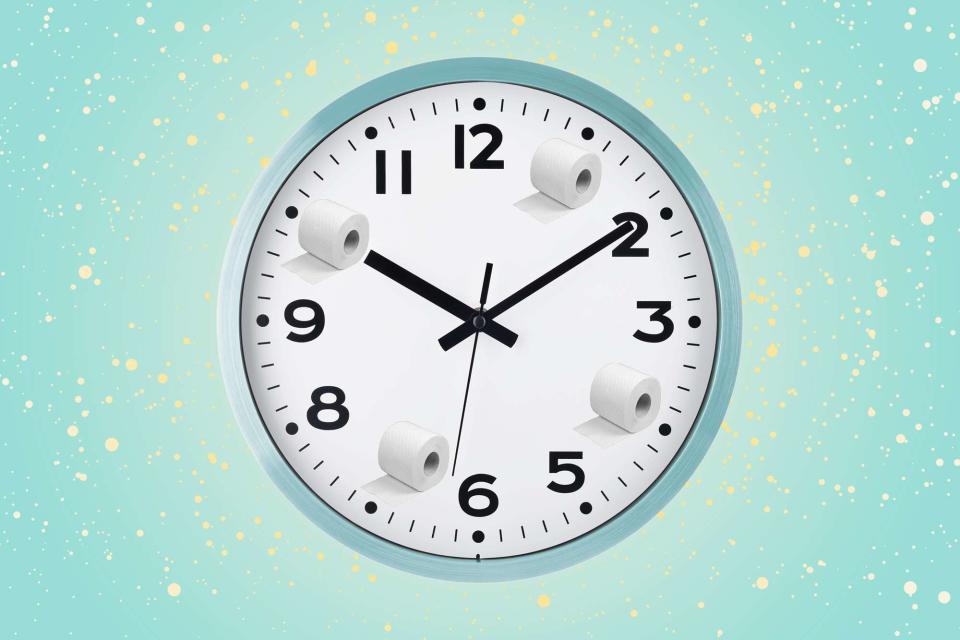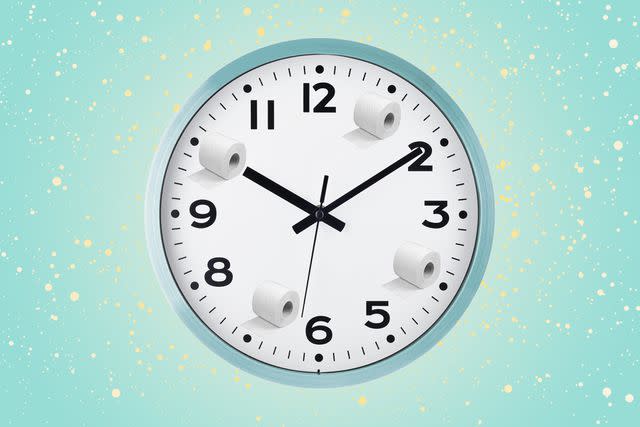How Often Should You Pee & When Is It Too Much? Here's What Doctors Say
Other factors and conditions besides drinking too much water can cause you to pee all-too-often—and might be a sign that something's off.

Reviewed by Dietitian Maria Laura Haddad-Garcia
All humans do this several times per day on autopilot. Since we were toddlers, it has just felt like a normal, fairly frequent part of every single day. But when was the last time you really sat to think about pee—and how and why it happens?
How often we urinate is determined by how rapidly our kidneys can filter waste and water to fill our bladder with pee. Our bladder size also plays a role. Once the bladder has expanded like a balloon, it puts pressure on the bladder muscles, which send a message to the rest of the body that it's time to go, the National Institutes of Health confirms.
Just like all of us have different "normal" levels of gas production and our own "normal" number of poops per week, humans pee at different rates. So we tapped health experts to help us tell what might signify that we're staying hydrated—and when we might be peeing so much, it's our body's way of telling us something might be askew.
Related: Why Am I So Gassy at Night? Here's What a Dietitian Has to Say

How Often Is Normal?
The average person urinates about every 3 to 4 hours, for a total of 6 to 8 times per day; the experts we spoke to agree. Anywhere from 4 to 10 pees daily can be considered normal if that's your routine.
We tend to feel a strong need to urinate when we have between 350 to 600 milliliters of urine in our bladder, adds Brooke Faught, D.N.P., WHNP-BC, a Franklin, Tennessee-based board-certified women's health nurse practitioner. And when you feel the urge, don't hold it—this can lead to bladder muscle damage over time, or in severe cases, recurrent urinary tract infections or a decline in kidney function, says April Adams Szafran, M.D., Ph.D., a urologic surgeon at Northwest Community Healthcare, a part of NorthShore in Arlington Heights, Illinois.
"Generally, we urinate at regular intervals," says Kristen R. Scarpato, M.D., an associate professor of urology at Vanderbilt University in Nashville, Tennessee. "But some people may notice the need to go more or less regularly depending on a variety of factors. Urination can be a reflection of many activities in our bodies or factors in our environment."
Our fluid and food intake, medications and certain health conditions can cause our pee performance to fluctuate.
Related: 4 Signs You're Drinking Too Much Water
Symptoms That May Mean You're Peeing Too Much or Not Enough
We each have our own fingerprint, our own "perfect" pair of jeans and our own usual amount of urination. So your best bet to know if something is "off" is to compare what you've done in the past to what you're doing now.
"Listen to your body. If you feel that something is not right with your urination—you're going more or less often, or different amounts than normal—talk to your doctor," advises Scarpato. "While these changes may be OK, a shift in your urination levels may indicate that something is happening in your body that should be evaluated further." (See "When to See a Health Care Provider" below for more.)
Conditions That Affect How Often You Pee
Szafran explains that many factors influence the volume and frequency of urine production. Everything from the time of day (while sleeping, the kidneys generally decrease activity and urine production) to body size (weight may play a role in urinary function) may impact how often you feel the need to urinate.
The following conditions may also be related to how often you pee.
Overactive Bladder (OAB)
This term refers to a group of bladder symptoms, including urinary frequency, strong urge to urinate and loss of urinary control (aka incontinence).
"OAB is caused by improper nerve signals between the bladder and the brain and increased activity or sensitivity of your bladder muscles. This is not uncommon—and can be very bothersome," says Scarpato.
Diabetes
Some patients with diabetes experience an increase in the need to urinate, particularly how often they feel the need to go, clarifies Scarpato. When the kidneys detect extra sugar in the blood, they pump out more urine to try to chip in to help eliminate that sugar. At high levels, blood sugar can also seep into the urine, which can irritate the bladder and cause people with diabetes to pee more, say Scarpato.
Urinary Tract Infection (UTI)
When a person has a urinary tract infection, the bacteria irritate the bladder lining, leading to that burning sensation that anyone who's felt before will never forget. UTIs may also trigger bladder pain, even when you're not peeing.
"This pain can make it hard for you to urinate or lead to leakage of urine. Sometimes, a UTI can cause you to need to go more frequently," adds Scarpato.
Kidney Damage or Disease
In rare cases, lower amounts of urine or less frequent urination may be a sign of kidney disease (which can be caused by diabetes, high blood pressure, certain medications, repeat kidney infections, bladder/kidney stones or urine blockage) or damage. Watch for other symptoms like fatigue, nausea or muscle cramps, which often come along with kidney damage or disease, says Scarpato.
Pregnancy
Hormones and heightened pressure on the abdomen and pelvis can increase urine frequency during pregnancy, Faught explains.
Obstructive Sleep Apnea
When left untreated, obstructive sleep apnea can not only raise the risk for heart disease but can also result in feeling the need to wake up to urinate multiple times overnight, says Szafran.
Heart Disease
According to Szafran, any decrease in blood flow to the kidneys—often impacted by how well the heart is performing—can decrease how much urine your kidneys produce in a day.
Enlarged Prostate
Males with an enlarged prostate, technically called benign prostatic hyperplasia (BPH), often notice changes in their urination.
"If the prostate grows in a way that blocks the flow of urine, it can become difficult to empty the bladder. This may result in only small amounts of urine each time they go to the bathroom. Some men may need to go more frequently, about every one to two hours, particularly at night, due to difficulty emptying the urine," says Scarpato.
5 Ways to Pee Regularly (but Not Too Often)
The following strategies can be beneficial to help you hit the sweet spot of six or so pees per day.
Hydrate. How much water you should drink daily depends on factors like age, activity level and weight. Szafran says the goal is to produce around 2 liters of urine per day (unless you have certain conditions, such as heart failure). Begin to start sipping a bit less about two hours before bed so you're less likely to need to wake up in the middle of the night.
Limit caffeine and alcohol. Scarpato says these can act as diuretics, causing the body to make more urine. Acidic foods and drinks, artificial sweeteners and sugars may also irritate the bladder lining for some individuals.
Fill up on fiber. In addition to supporting digestion, making meals more satisfying and lowering risk for several chronic diseases, fiber helps keep your gastrointestinal tract shipshape. "Bowel health is directly tied into urogenital health. Avoid constipation by drinking plenty of water and eating a diet high in fiber," says Faught.
Don't go "just in case." "Pay attention to bladder urges. Use the restroom in a timely manner after you first notice the urge to urinate," suggests Faught. That being said, avoid frequent trips to the bathroom "just to try." This trains the bladder to notify you with inappropriately small volumes, leading to more frequent peeing over time.
Do Kegels. If you're physiologically female, pelvic floor strengthening exercises known as Kegels can help tone the muscle group that supports the bladder, bowel and vagina, among other structures, says Faught. In some cases, working with a pelvic floor physical therapist may be helpful.
Related: The 6 Best Natural Diuretic Foods and Drinks, According to a Dietitian
When to See a Health Care Provider
"If your urination habits are bothersome or become disruptive to daily activities, it's time to consult your doctor," says Faught. They may refer you to a urologist if needed.
If you experience any of these symptoms, you should also check in with your M.D.:
Urinating more than every 2 hours, especially in small volumes
Peeing more than 10 times per day, or more than 3 times nightly
Regularly going 6 or more hours without the sensation to pee
Sudden onset of an urge to urinate with minimal warning
Leakage of pee
A significant difference in how much or how often you're urinating
Painful urination
Blood in urine
Difficulty starting to pee
An inability to complete bladder emptying
Recurrent UTIs
Frequently Asked Questions About Pee
Is peeing every 2 hours normal?
It may be for you, but the average person pees every 4 hours or so. If you're peeing more frequently than every 2 hours—or more frequently than is usual for you—consult your primary care doctor.
Is it OK to pee 15 times per day?
Urinating more than 8 times per day is considered "frequent urination." At this rate, peeing becomes a daily inconvenience and may be a symptom of an underlying condition. Again, speak to your doctor if you're peeing more than 8 times per day (and that's not common for you).
How long does it take for water to become pee?
The body absorbs and processes water fairly quickly, within about 30 minutes or less. Urine then collects in the bladder until it feels full and tells the body it's time to pee.
How long can you go without peeing?
Going from a completely empty bladder to a completely full, amply sized bladder would take about 9 to 10 hours. It's not advisable to hold in urine this long unless absolutely necessary. Aim to stay hydrated enough to pee once every 3 to 4 hours.
The Bottom Line
Pee is personal. And by that, we don't mean that you shouldn't talk about it, but we do mean that frequency and output vary by the individual. As a general rule, the healthy adult, on average, pees 6 to 8 times per day.
If you notice any stark changes in how much or how often you urinate, check in with your doctor—especially if you experience any pain, an urgent need to pee, leakage when not trying to pee, blood in your urine, trouble peeing or persistent UTIs.

